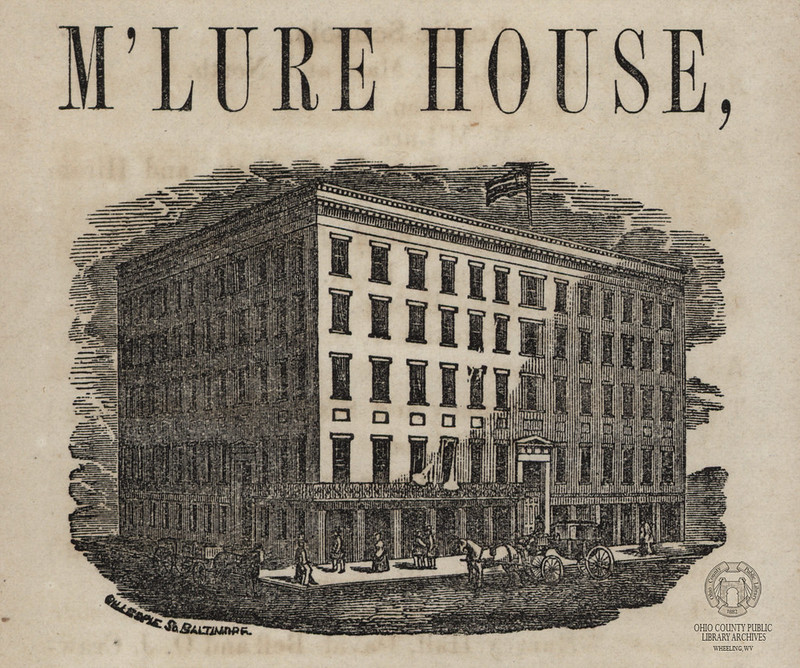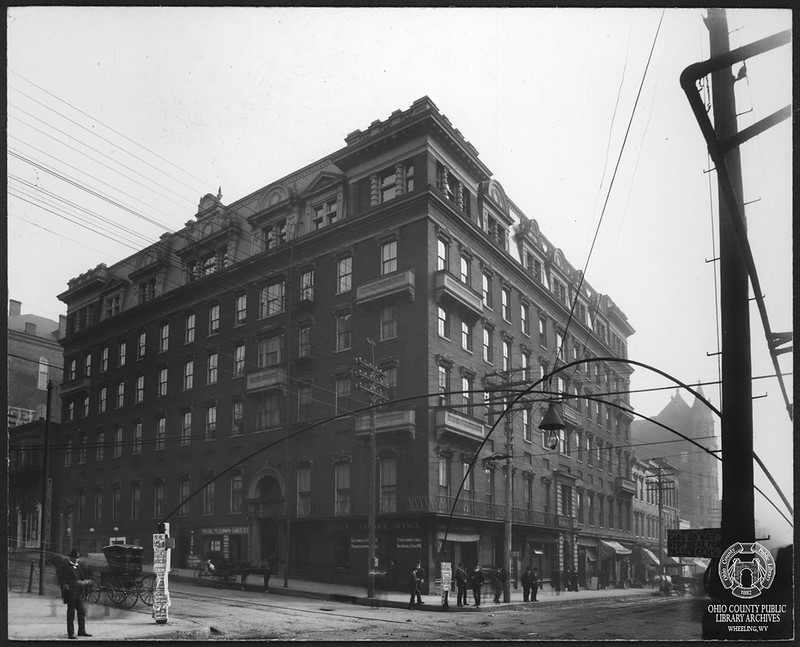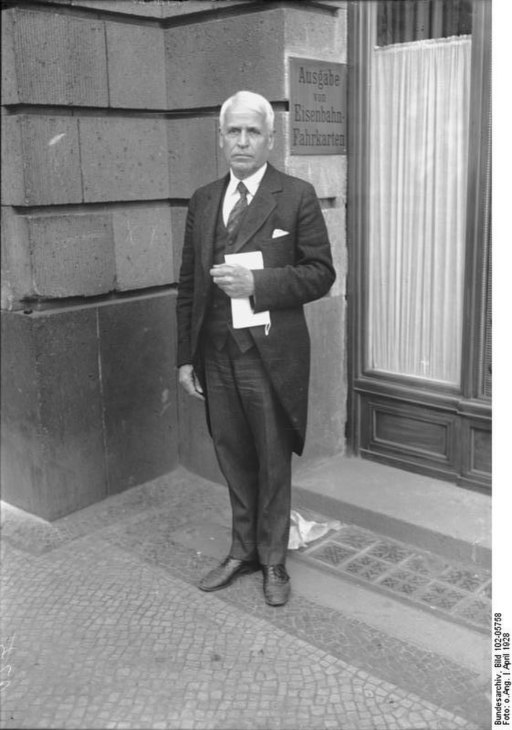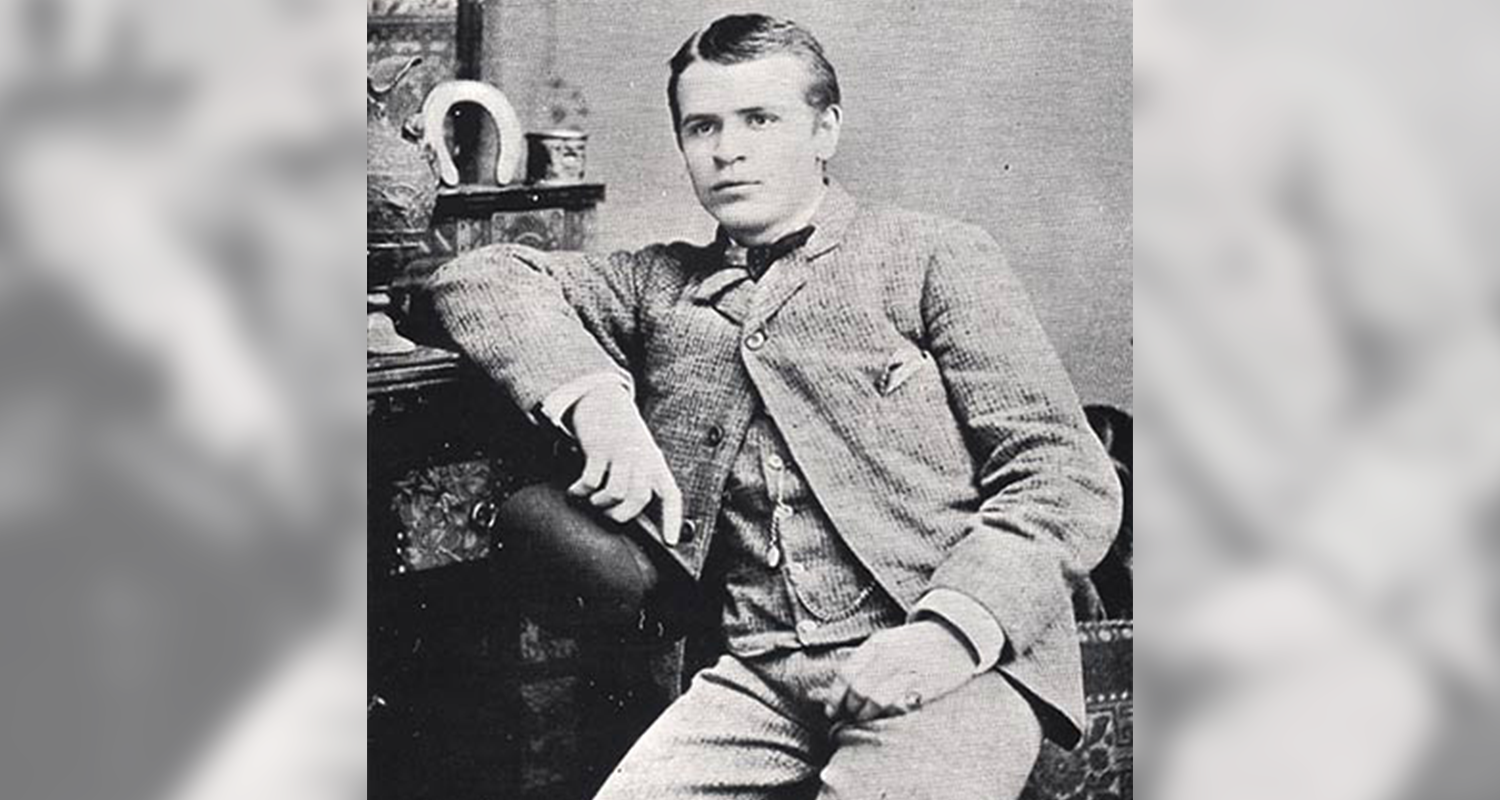Walking or driving down Market Street recently, you may have noticed some new activity at the McLure Hotel, including a new paint job, but the establishment has a much longer history. Originally named the McLure House, the hotel opened on March 4, 1852 and has hosted thousands of visitors and dignitaries, including Civil War generals, entertainment celebrities, and 11 U.S. presidents.1 The McLure has seen countless changes to both its ownership and the building itself.
As new life is breathed into the historic McLure Hotel in Downtown Wheeling, it’s worth taking a look back at one of history’s most successful businessmen who got his early start at the McLure—Ellsworth Milton “E.M.” Statler.

A Budding Entrepreneur
Ellsworth Milton Statler was born during the middle of the Civil War near Gettysburg, Pennsylvania on October 26, 1863.2 During his young childhood, the Statler family moved west to Bridgeport, Ohio—right across the river from a bustling Wheeling. Child labor laws were virtually non-existent in the 1870s, so it was not uncommon when Statler began working at the La Belle Glass Works at the young age of nine.3
A few years later, at the age of 13, he began working at the McLure Hotel as the night bellboy. He rose in the ranks to head bellboy to clerk to managing the hotel books.4 While at the McLure, Statler was constantly looking for opportunities to make the hotel more profitable.
One of his first projects was to reinvent the McLure’s billiard room into a popular and lucrative side business.5 In addition, right outside the billiard room, Statler set up a railroad ticket book where he sold railroad mileage tickets that he bought in bulk. Even though he sold them for half a cent more than he bought them, the tickets were still cheaper than buying them at the station—a win for both parties. According to several sources, this was the first type of railroad ticket counter to start in an American hotel—a service that other hotels would eventually pick up.6
Statler expanded his Wheeling business interests outside of the McLure when he bought out and dissolved a bankrupt bowling club that was operating out of the Musee, a defunct vaudeville hall, at 1124 Market St. Borrowing money, Statler quickly expanded the bowling lanes and added other entertainment options, including pool and billiard tables.7 After the bowling alley started showing promise, Statler converted the storefront space into a small lunchroom restaurant, The Pie House, which was run by his mother and sister.8
Even as a very young man, E.M. Statler had set himself apart in Wheeling as an innovator and entrepreneur—a reputation and skills he would cultivate to become one of the most successful businessmen of the late 19th and early 20th centuries.

“The Hotel Man of the Half-Century”
Statler’s first big move outside of Wheeling was opening the Statler Restaurant in 1894 in Buffalo, New York.9 He then used his eventual profits to really get started in the hotel business with temporary hotels for two world’s fairs. In 1901, Statler built his first hotel, albeit temporary, in Buffalo for the Pan-American Exposition, a multiple-month event that reportedly drew 8 million visitors. The Exposition flopped, especially due to the assassination of President William McKinley during one of the events, but Statler managed to break even. His second temporary hotel was for the Louisiana Purchase Exposition in St. Louis in 1904.10 In 1907, Statler returned to Buffalo to open his first permanent hotel, the Hotel Statler with 300 rooms, which eventually grew into a chain with locations in Cleveland, Detroit, St. Louis, New York, and Boston.11
One of the aspects that set Statler and his hotels apart in the growing hospitality business was his focus on cost effective amenities for patrons to his affordable middle-class hotels. The Buffalo Statler was one of the first hotels to have private baths with rooms, instead of a communal bathtub at the end of each hall. This gave rise to the catchy phrase, “a room and a bath for a dollar and a half!” Other radical amenities included rooms with closets, full length mirrors, hotel stationary, and a simple sewing kit for loose button emergencies.12 While many of these conveniences are considered commonplace in virtually every American hotel or motel today, they were exceptional when Statler introduced them.

Statler died in 1928, but his second wife Alice continued to expand the business, opening locations in Pittsburgh, Washington D.C., Los Angeles, Dallas, and Hartford. Many of the later Statler hotels had thousands of rooms and the buildings still exist today. In 1954, Statler Hotels was bought by the competing middle-class hotel chain, Hilton, for $111,000,000 (worth over $1.074 billion today). At the time, it was the largest real estate transaction in American history.13
Statler’s estate created the Statler Foundation which continues to fund students and opportunities in hotel management and hospitality. Statler’s entrepreneurial reputation that began in Wheeling had grown so tremendously that he was described by some of his contemporaries as “the hotel man of the half-century,” even decades after he had died.14
• Emma Wiley, originally from Falls Church, Virginia, was a former AmeriCorps member with Wheeling Heritage. Emma has a B.A. in history from Vassar College and is passionate about connecting communities, history, and social justice.
References
1 “The McLure House Hotel in Wheeling,” Ohio County Public Library, accessed August 5, 2021, https://www.ohiocountylibrary.org/research/wheeling-history/3374.
2 “Wheeling Hall of Fame: Ellsworth Milton Statler,” Ohio County Public Library, accessed August 5, 2021, https://www.ohiocountylibrary.org/history/4160.
3 Rufus Jarman, A Bed for the Night: The Story of the Wheeling bell-boy, E.M. Statler, and his remarkable hotels, (New York: Harper & Brothers Publishing, 1952), 15.; “Wheeling Hall of Fame: Ellsworth Milton Statler,” Ohio County Public Library.
4 Jarman, 3, 16.; “Wheeling Hall of Fame: Ellsworth Milton Statler,” Ohio County Public Library.
5 David Kohrman, “E.M. Statler: The Father of the American Hotel,” Forgotten Detroit, June 24, 2001, accessed August 6, 2021, http://www.forgottendetroit.com/statler/emstatler.html.
6 Jarman, 19-20.; “Ellsworth Statler,” Conrad N. Hilton College of Hotel and Restaurant Management, University of Houston, accessed August 5, 2021, https://uh.edu/hilton-college/About/Hospitality-Industry-Hall-of-Honor/Inductees/Ellsworth-Statler%20/.
7 Kohrman, “E.M. Statler: The Father of the American Hotel.”; Jarman, 21.
8 Jarman, 21.
9 Kohrman, “E.M. Statler: The Father of the American Hotel.”
10 Kohrman, “E.M. Statler: The Father of the American Hotel.”; “Ellsworth Statler,” Conrad N. Hilton College of Hotel and Restaurant Management.
11 Kohrman, “E.M. Statler: The Father of the American Hotel.”
12 Kohrman, “E.M. Statler: The Father of the American Hotel.”; Jarman, 3.
13 Kohrman, “E.M. Statler: The Father of the American Hotel.”; “Ellsworth Statler,” Conrad N. Hilton College of Hotel and Restaurant Management.
14 “Wheeling Hall of Fame: Ellsworth Milton Statler,” Ohio County Public Library.



